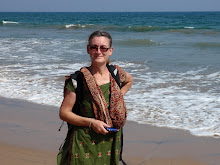I had a fun start to the day today and did my laundry. I decided it really was time to wash the sheets I'd been using ever since I arrived here in Koraput. That might seem a bit rash given that I've not been here a fortnight yet but the room is so damp that eveyrthing gets to smell musty very quickly. Washing sheets in cold water bent over a bucket is a challenge. I ended up sloshing the sheets between buckets while I took them through the rinse cycle but the spin cycle was more awkward and I had to resort to wringing them out on the roof where the washing line is hung. You mean not everyone has washing lines on their roof? At least the 4 dogs I found curled up on there yesterday had vanished, I was glared at out of one eye which followed every move until I went back downstairs. There are hundreds of feral dogs living on the streets (and roofs) here, some of them in miserable looking condition and rabies is endemic. I'm glad I've had the jabs.
At last my boss has returned to the office and I've started to get a better idea of what I need to do over the next few months. This was the first opportunity I had to start to understamd my NGO SPREAD, it's structure and the work that they do. Very impressive work it is too, supporting and activating the tribal people (or Adivasis) in the district to achieve their rights. The Adivasi comprise around 50% of the population in Koraput. They have many problems mostly as a result of displacement and dispossession of their land. Historically, tribal people did not own their own land but tribal groups made use of their area during their lifetime so that it remained within the jurisdiction of that tribe in perpetuity. During the time of the British occupation there was a drive to collect as much tax as possible from landowners and to do that, land had to be held in the name of specific individuals and many tribes lost the use of their land as a result. Over the last couple of centuries more and more Adivasis have lost their land - mining, reservoirs, factories and probably a host of other reasons I haven't heard about. Many of them suffer serious problems including food insecurity (malnutrition and starvation is not uncommon), lack of resources, lack of capital (some borrow to try to make a living or pay hospital bills and may be charged up to 150% interest), lack of education and a host of health problems. The Indian Constitution has laws that give them the same rights as anyone else in the community but they are often not able to achieve their rights. NGOs like SPREAD (Society for Promoting Rural Education and Development) are working with these people to give them the support and knowledge they need to try to attain their rights. It would be great if I can make some small contribution to helping their work, it's impressive. I've been told they need organising so I'd better start bossing people around!
For those of you who followed my blog on the VSO site, you may remember me complaining about the cost of a phone call that I received on my UK mobile, whinging that it cost me £17 to receive at 13 minute call. Jon happily informed me that it cost him £1.06 to make the call. Now that just isn't right.
6 months ago




No comments:
Post a Comment